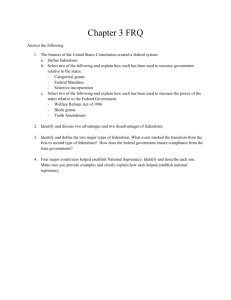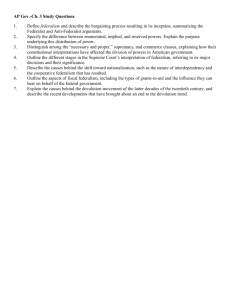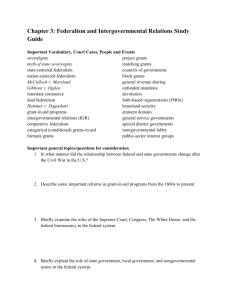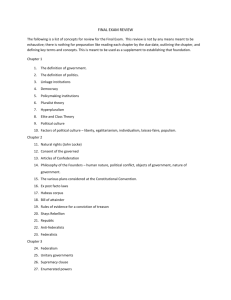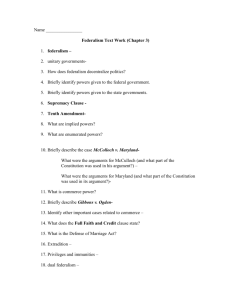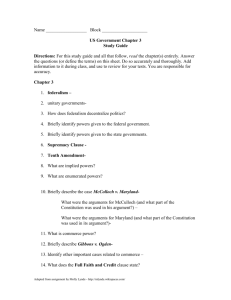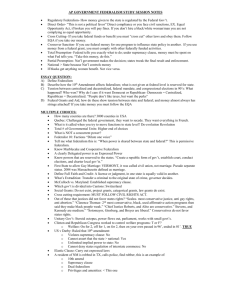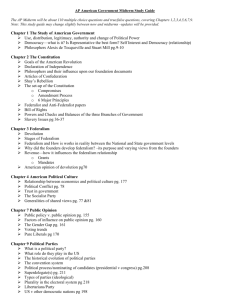Federalism - Bama.ua.edu
advertisement
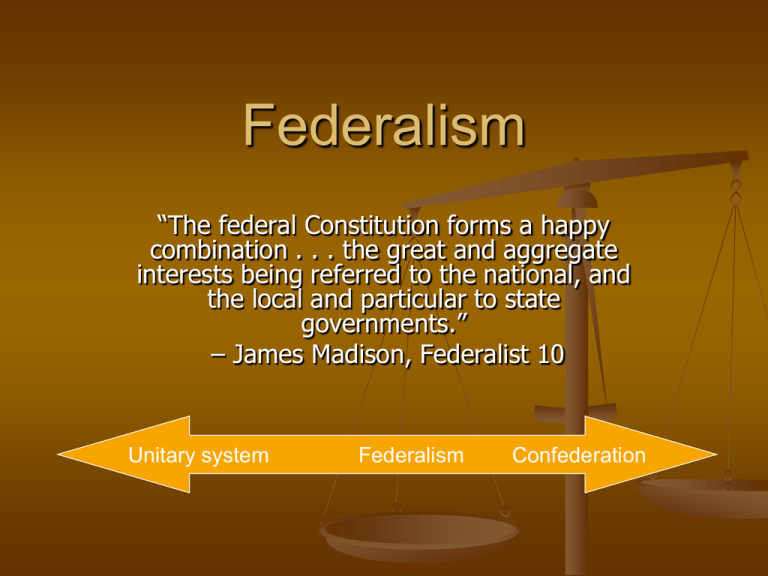
Federalism “The federal Constitution forms a happy combination . . . the great and aggregate interests being referred to the national, and the local and particular to state governments.” – James Madison, Federalist 10 Unitary system Federalism Confederation American Federalism Dual Federalism (layered cake) “States’ rights” National gov’t limited to enumerated powers Dual sovereignty, dual citizenship Cooperative Federalism (marbled cake) “We the people” (i.e. not the states) National gov’t can expand with “elastic clause” State sovereignty limited by “supremacy clause” American Federalism (continued) Picket-fence Federalism Pragmatic policy-making is more important than theoretical arguments and formal divisions Still takes into account the background of separation American Federalism is a Dynamic system characterized by 1) Ambiguity 2) Pragmatism (political, logistical, & economic) 3) Policy-based Organization The Dynamics of American Federalism What moves this dynamic? 1) National Crises & Demands crisis increases need for unified direction, effort, & resources; e.g. Great Depression, 9/11 Some national needs require unity & coordination; e. g. Nutrition Labeling and Education Act 1990 2) Judicial Interpretation Possible (inherent?) contradictions in Constitution Challenges to new legislation (especially preemptive legislation) are often based on interpretations of the 10th Amendment Conflicting interests often use whichever position favors their cause 3) Financial Incentives/Fiscal Federalism Categorical Grants, Block grants e.g. South Dakota v Dole 1987, Stimulus Package 2009 4) Professionalization of State Gov’t Internal changes (e.g. higher salaries, better education, fulltime staff) State tax & budgetary reform Fiscal Federalism (e.g. E&SEA 1965 - NCLB 2001) The Dynamics of American Federalism (continued) Trends in Federalism In America Growth of local gov’t Expansion of national gov’t county gov’t (some townships), municipal gov’t, school districts, some special districts Over 87,000 local gov’t Growth of Preeminent legislation Abroad States’ abroad >30 have intnat’l trade directors Most have foreign offices of some kind The European Union Africa, Iraq Pros & Cons “Laboratories of Democracy” Experimentation & Competition Diversity & Freedom of Choice Greater Participation & Responsiveness Efficiency, Decisiveness, Speed of Action Conflict Management May help governing of diverse & semi-autonomous groups May also contribute to or prolong conflict e.g. Germany, Iraq Pros & Cons Minority Rights “Race to the Bottom?” Factions, benefits of a “large republic” History of Intolerance (e.g. Voting Rights Act 1965, protection of civil rights) States determine social welfare benefits They also compete to be the home of businesses Does one affect the other? Lack of Accountability? Sharing burden, but also blame e.g. Hurricane Katrina Federalism Fun Facts – who spends what (circa 2005-06)? EDUCATION (K-12)---Feds provide 9%, States 47.3%, Local govts. 43.7% HEALTH CARE---Feds provide 31.5%, States 12%, Others 56% PRISONERS---Federal 12.3%, State & local 87.7% HIGHWAYS—Feds provide 28.78%, States and locals 71.22% INCOME SECURITY (welfare) – Feds provided about 2/3 in 1995 KEY SUPREME COURT CASES in Federalism McCulloch v. Maryland (1819) -- Bank of US, N & P clause Gibbons v. Ogden (1824) – steamboat case, IC clause Child labor, minimum wage, monopoly cases in late 19th Century, IC clause NLRB v. Jones & Laughlin Steel (1937), IC clause Heart of Atlanta Motel v. US (1964), IC clause Are we in the middle of a “states’ rights” revolution? US v. Lopez (1995) -- guns ‘n’ schools Printz v. US (1997) -- Brady bill US v. Morrison (2000) – VAWA Revival of “sovereign immunity” principle Gonzales v. Oregon (2006) – assisted suicide More and more states “going it alone” on environment, min. wage, health care, stem cells NOT SO FAST, my STATES’ RIGHTS FRIEND! 1.) Continuing Pre-Emption by Federal Govt. in selected policy areas (election reform, voter registration, education standards, gunmaker liability, tort reform, health insurance) 2.) Countermoves by Supreme Court (medical marijuana, disability access) MORE ON GRANTS MANDATES – funded or unfunded Competitive categorical grants Formula categorical grants Block grants – welfare converted to a block grant in 1996 Political incentives for block grants (Stimulus spending school example)

